|
|
|
Sort Order |
|
|
|
Items / Page
|
|
|
|
|
|
|
| Srl | Item |
| 1 |
ID:
190993
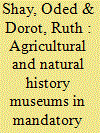

|
|
|
|
|
| Summary/Abstract |
The establishment of agricultural and natural history museums in Jerusalem (1920) and Tel Aviv (1925) by individual and institutional Jewish entrepreneurs was a corollary of the wave of exhibitions and fairs in Western countries that swept across Mandatory Palestine’s Jewish community (Yishuv) in the 1920s. Yet it also reflected Zionist ideals and perceptions and as such served as a catalyst for providing modern agricultural education to the Yishuv’s urban classes.
|
|
|
|
|
|
|
|
|
|
|
|
|
|
|
|
| 2 |
ID:
179850
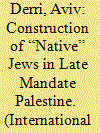

|
|
|
|
|
| Summary/Abstract |
This article concerns the place of late Ottoman Jews in Palestine on the eve of the 1948 War. It focuses on Israel Ben-Zeʾev (Wolfensohn), a Jerusalem-born educator and Nahda intellectual who led a movement of self-identified “native” Jews, including both “Old Yishuv” Ashkenazim and Sephardim, to combat their marginalization by the Zionist institutions. I examine his lifetime struggle to advance the study of Arabic and “Arab Jews” (yahud ʿarab) under early Islam by creating institutions of knowledge production and educational programs modeled on those he knew from his early academic career in Cairo. It was in the context of these struggles that demands for separate political representation for native Jews and for a specialized field of Arab Jewish studies coalesced as part of a broader project of a shared Arab-Jewish cultural modernization. They culminated in 1948, when Ben-Zeʾev finally realized his Arabic library project, ironically using looted Palestinian books, only to see its destruction four years later by Zionist leaders and Hebrew University professors.
|
|
|
|
|
|
|
|
|
|
|
|
|
|
|
|
| 3 |
ID:
171051
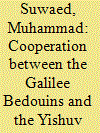

|
|
|
|
|
| Summary/Abstract |
During Israel’s War for Independence, the Bedouin tribes did not have a united attitude: Some tribes, who built good relations with the Jewish population, supported the Jewish side and fought with them, whereas other Bedouins tribes considered themselves part of the Palestinian population and fought with them. There were also tribes that supported no side and kept neutral.This article focuses on the Galilee Bedouin tribes, who chose to cooperate with the Jewish Yishuv and fought on their side. The article explains the background on which the relations between the Bedouins and the Jews in Galilee were built at the end of the Ottoman era and during the British mandate. It also examines the mutual trust and friendship that had developed between the Jewish population and their neighbor Bedouin tribes, leading them to cooperate with the Jewish side and support their cause. It analyzes causal factors and historical events that led certain Bedouin tribes to fight against the Jews and support the Palestinian side, and the reasons tribes kept neutral in this conflict.
|
|
|
|
|
|
|
|
|
|
|
|
|
|
|
|
| 4 |
ID:
141609
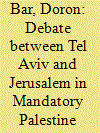

|
|
|
|
|
| Summary/Abstract |
During the Mandate era a custom of re-interment of Jewish thinkers and leaders developed. These were mostly Zionists leaders and ideologists who passed away in the Diaspora and their remains were brought to be buried in Palestine. The article deals with the conflict between Tel Aviv and Jerusalem on the right to re-inter within their boundaries Zionist leaders such as Theodor Herzl, Max Nordau, Leo Motzkin and Yehuda Leib Pinsker. Although this phenomenon was universal, the Zionist case was unique and exceptional as most of the political Zionist activity took place outside of Palestine, mostly in Europe.
|
|
|
|
|
|
|
|
|
|
|
|
|
|
|
|
| 5 |
ID:
169979
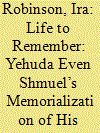

|
|
|
|
|
| Summary/Abstract |
Shmuel Asher Kaufman (1927–1947) died in a live ammunition training accident as a member of the Palmah in spring 1947. His father, Yehuda Kaufman Even-Shmuel (1886–1976), lovingly reconstructed his brief life and his story entered Israeli mythology, along with that of his fiancée Zohara Levyatov, as symbolic of the loss of the young Israeli men and women whose lives were lost in the struggle for Israel’s independence. This article examines the process by which Shmuel’s life was memorialized by his father in the decade after his death. It also begins to mine the wealth of documentation provided by this memorialization of Shmuel’s life in order to examine from a unique perspective the variety of social, religious, and educational choices available to members of the Yishuv’s elite during the Mandate period. In addition, it discusses the impact of Shmuel Kaufman’s tragic death on the crisis of Yehuda Even Shmuel’s Zionist vision, which led him to resign from the Mapai Party in 1947.
|
|
|
|
|
|
|
|
|
|
|
|
|
|
|
|
| 6 |
ID:
089121
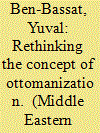

|
|
|
|
|
| Publication |
2009.
|
| Summary/Abstract |
An examination of the diverse Hebrew newspapers published in Palestine in the aftermath of the Young Turk Revolution of 1908 teaches us a great deal about the complexity of the term Ottomanism, which was interpreted differently by the Empire and the minorities remaining within its shrinking borders. Whereas the Empire officially perceived Ottomanism as a new form of hybrid identity which would substitute existing national identities, the yishuv's various sectors envisioned a decentralized empire under the house of Osman. In this sense, the Revolution encouraged the emergence of a shared national vision among many circles in the yishuv, although each group still strove to shape the character of the Zionist community in Palestine according to its own agenda.
|
|
|
|
|
|
|
|
|
|
|
|
|
|
|
|
| 7 |
ID:
095111
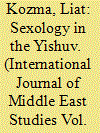

|
|
|
|
|
| Publication |
2010.
|
| Summary/Abstract |
In late 1931, German sexologist and gay-rights activist Magnus Hirschfeld, quoted above, visited Palestine for a lecture tour that attracted hundreds in Tel Aviv, Jerusalem, Haifa, and kibbutz Beit Alfa. By this time, the Jewish settlers' community (or Yishuv) in Mandate Palestine had already been exposed to the science of sexology and to the reform movement it inspired. Sexual-hygiene manuals had been translated into Hebrew and Yiddish in both Tel Aviv and Warsaw. Hebrew readers had access, for example, to translations of Auguste Forel's Sexual Ethics and Max Hodann's A Boy and a Girl. Finally, in the fall and winter of 1931-32, three sex consultation centers were opened in Tel Aviv.
|
|
|
|
|
|
|
|
|
|
|
|
|
|
|
|
|
|
|
|
|